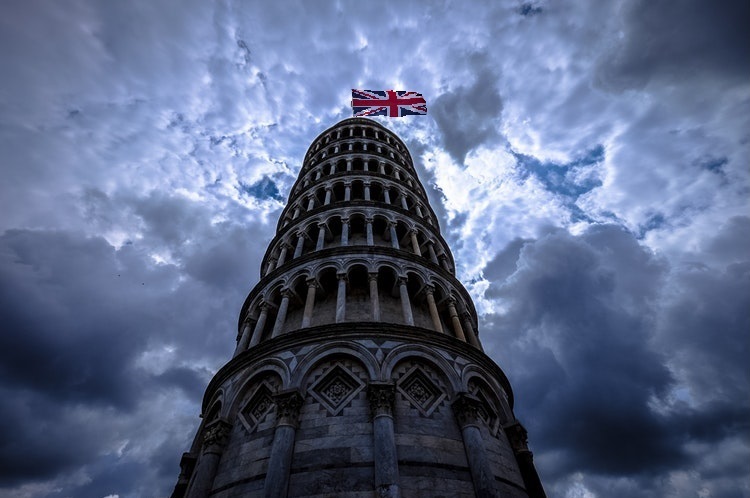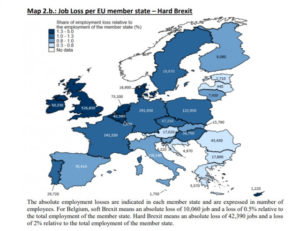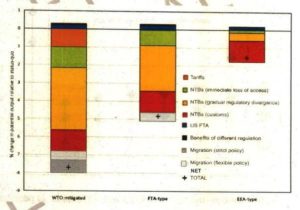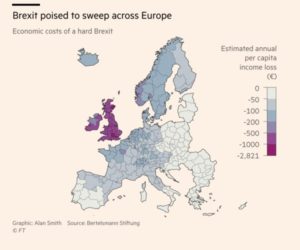
According to the study by the University of Leuven (Belgium), Italy would lose 139 thousand jobs and 18.5 billion euros with the Brexit No-Deal
(questo articolo in Italiano, qui)
by Gabriele Bonafede
The Brexit account will be expensive for the United Kingdom. All the studies prove it. And the United Kingdom trades for several tens of billions with Italy. Presumably, even without any study, it soon becomes clear that Italy will pay for reduced exports because it is more expensive, for reduced imports for consumers and businesses because it is more expensive. But also in terms of lost jobs.

Italians seem not to be interested in the problem. Many consider Brexit an exclusively British or “English” problem, confusing England with the United Kingdom.
At most they consider it a problem of Germany, or of France, or of Europe: with extreme vagueness. And in any case something “far away”, geographically and over time.
The reality is not so. As for the weather, unfortunately, this being the case, Brexit is imminent. It will happen in less than a month, to see the news coming from London.
The last minute proposal by British Prime Minister Boris Johnson appears as a thing without a construct. Already rejected, in fact, by the European Parliament and by the Europeans closest and most involved, that is the Irish and their government, it seems to have been set up to arrive at the Brexit No-Deal, without any agreement.
From an economic and geographical point of view, the “distance” from the problems triggered by Brexit is not as Italians believe. The reality is much closer.
Brexit, a hot summer report
In a study commissioned by the Belgian government to University of Leuven, and published last summer, the numbers are simply dramatic. Also for Italy. The report (in English) from the University of Leuven can be downloaded here.

The study analyzes the impact of Brexit in the two main scenarios, the most probable ones. That is, Brexit No-Deal (or hard-Brexit) and Brexit with a trade agreement (or soft-Brexit, or with a Free Trade Agreement).
Obviously we talk only about the economy and not about many other aspects such as the freedom to move across European continent for the British. And the freedom to enter and leave the United Kingdom, for Europeans.
Using the methodology of Leontiev’s input-output tables, the study has the advantage of being much more detailed. That is, to provide impact estimates at national and sectoral level. Obviously it is focused on Belgium, but there are estimates of the impact on the economy of each European Union country.
No wonder the price to pay for Brexit, especially No-Deal, will be much more substantial for the United Kingdom and Ireland, but also for countries with strong trade with the British Isles, primarily Belgium and the Netherlands.
Appalling impact on UK
In the United Kingdom there is a real catastrophe. In the scenario most likely today, namely that of the No-Deal, the British economy would contract by 4% and there would be more than half a million new unemployed. However, this appalling situation is an estimate that could even be optimistic.

Because it does not take into account other problems that the UK would have, starting with social unrest and going through the financial system.
It does not even take into account any adjustments regarding the structure of monetary exchange rates which, on the one hand could mitigate things, on the other could aggravate them with frightening effects on inflation in the United Kingdom.
It does not take into account either the dramatic impacts it would have on the political and social structure of UK. Where the equilibrium of a Kingdom is made up of four “entities” (England, Wales, Scotland and Northern Ireland). And are already in difficulty, starting from Northern Ireland and Scotland.
The impact of Brexit on Italy
Although geographically “distant”, Italy also has a negative impact from Brexit, especially in the case of the No-Deal. The University of Leuven’s estimate is a GDP contraction of over 18 billion euros, corresponding to around 1.2%. Job lost in Italy due to the Brexit No-Deal are estimated at 139 thousand units.

The impact is therefore strongly negative and, in fact, estimates a recession also for Italy, albeit less pronounced than that of other countries. In another study, published by the FT, it appears that the central northern regions of Italy (and Europe) will pay the highest Brexit bill more.
And this was pretty obvious. Because all the negative weight of Brexit concerns the production and export system, and therefore above all the Po valley for Italy. Precisely the regions that voted for the League, a party that does not hide its support for Brexit. The Salvini’s Leage, infact, hnts even to an “Italexit”. Which would mean a major disaster for Italy and EU.
For the Southern part of Italy it is also estimated a negative impact, although lighter than in Northern Italy.
How much will each Italian pay? On average, according to other data published by the FT, it is estimated that every Italian, due to the Brext No-Deal, will have a reduced income of 50 euros per year. In the north the “account” will be between 50 and 100 euros, while in the south it will be less than 50 euros according to this calculation, which is not the same as that of the University of Leuven.
In fact, if we divide the estimated cost by the University of Leuven by the number of Italians, the figure becomes around 300 euros per year for each Italian.
And next…
Much worse will go for the subjects of the gracious Queen Elizabeth, already in the calculation of the Belgian university. There every Briton will lose between 500 and 2800 euros per year, depending on the geographical area.
However, the studies published so far are somewhat “static”. They do not take into account, or take into account to a limited extent, the probable deleterious effects concerning the dynamics of economies.
That may evolve further after a negative shock of such a magnitude. In fact, the risk of triggering a vicious circle is very high, also in consideration of the senseless foreign trade & tariff policy currently being carried out by US, led by Trump…







